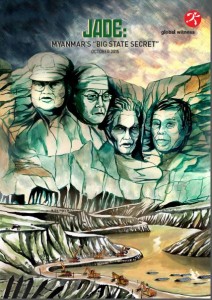JADE: Myanmar’s “Big State Secret”
By Global Witness • October 23, 2015 Since 2011, Myanmar’s rebranded government has told the world it is transitioning from a pariah state run by a ruthless military dictatorship to a civilian regime committed to wholesale political and economic reforms.
Since 2011, Myanmar’s rebranded government has told the world it is transitioning from a pariah state run by a ruthless military dictatorship to a civilian regime committed to wholesale political and economic reforms.
In important respects, there has been real change. Oft-cited examples include the release of Aung San Suu Kyi and other political prisoners, and the government’s peace talks with ethnic armed groups. But in other critical areas, the reformist narrative bears little scrutiny. Nowhere is this truer than in the jade sector.
Drawing on over a year of investigations, this report shows for the first time how a multi-billion dollar trade in one of the planet’s most precious gemstones is tightly controlled by the same military elites, US-sanctioned drug lords and crony companies that the government says it is consigning to the past. Companies owned by the family of former dictator Than Shwe and other notorious figures are creaming off vast profits from the country’s most valuable natural resource, and the world’s finest supply of a stone synonymous with glitz and glamour. Meanwhile, very few revenues reach the people of Kachin State, the site of the Hpakant jade mines, or the population of Myanmar as a whole.
Download this full report in English here.
Download this report executive summary in English here.
အစီရင္ခံစာ အႏွစ္ခ်ဳပ္ ျမန္မာဘာသာကို ဤေနရာတြင္ ေဒါင္းလုပ္ရယူႏိုင္ပါသည္။
အစီရင္ခံစာ အႏွစ္ခ်ဳပ္ ကခ်င္ဘာသာကို ဤေနရာတြင္ ေဒါင္းလုပ္ရယူႏိုင္ပါသည္။
Tags: ASEAN, Aung San Suu Kyi, Crimes against humanity, Environmental and Economic Justice, Global Witness, Human Rights, Human Rights and Business, Human Rights Violations, Military Regime, Than Shwe, ုုKachin StateThis post is in: ASEAN, Business and Human Rights, Children and Youth, Crimes Against Humanity, Displacement, Drugs, Economy, Environmental and Economic Justice, Ethnic Nationalities, Health, Human Rights, Law, Military Regime, Political Prisoners, Resistance, Women
Related PostsBurma Partnership Celebrates Continuing Regional Solidarity for Burma and Embraces the Work Ahead for Progressive Voice
Myanmar’s New Dawn :Opportunities for Aung San Suu Kyi and U.S.-Myanmar Relations
Expanding People’ Solidarity for a Just and Inclusive ASEAN Community
Civil society launches #FreeThe5KH campaign in support of the imprisoned ADHOC staff and NEC official
Myanmar logging ban a major step to forest sector reform









 All posts
All posts